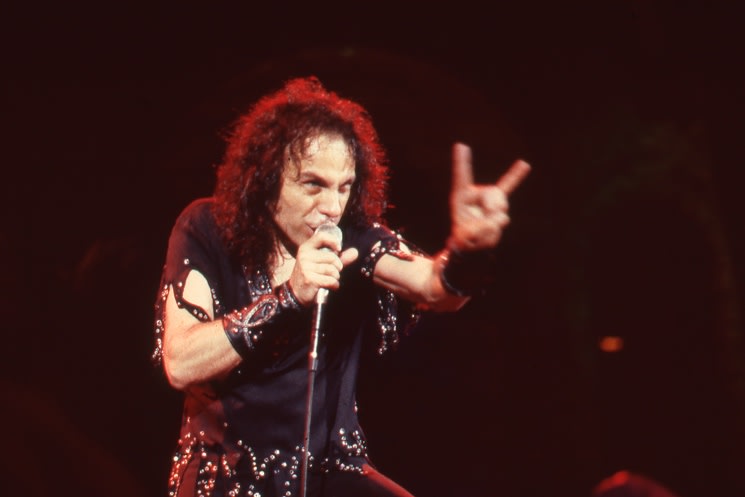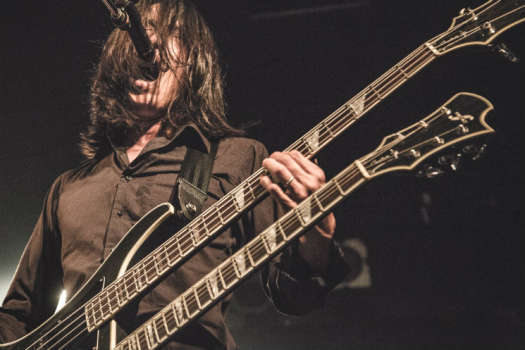An interstitial beat in Dio: Dreamers Never Die has drummer Vinny Appice sitting in front of a pile of demo tapes. He pulls out one marked "jam" and pops it in to listen, not knowing what to expect. Excited by what he hears, he exclaims, "Jam!"
The movie is searching for tangible reminders of a metal legacy, things to show in their subjects' hands or around them. The film opens with an unnamed voice waxing on the romance of wax, the mystery and excitement of picking up a metal record back in the day. These things have power.
In tracing the history of Ronnie James Dio, directors Don Argott and Demian Fenton look for whatever physical artifacts they can find: a seven-inch for an old band, the original album art for Holy Diver, an action figure, or Dio's old trumpet.
Dio charted a course through a half-dozen musical moments, starting out in the 1950s with rock before moving into 1960s mop-topped counterculture. The story really picks up with Elf and Rainbow, 1970s hard rock acts that preface his stepping in as the second lead singer of Black Sabbath after Ozzy Osbourne. In time, he splits off from that, moving on to his eponymous act that solidified his status as a metal god.
He passed away in 2010 and consequently is not interviewed for this film, only appearing in archival footage. The story is told through talking heads, featuring former members of his bands, notable fans like Rob Halford, Sebastian Bach and Lita Ford, and professional myth-maker Eddie Trunk, among others.
The interviewees also include Dio's manager and wife, Wendy Dio, who is also an executive producer on the film. Wendy's involvement screams "authorized doc" to me and asks how willing the filmmakers would be to be critical of their subject. Of course, who really has an ill word against Dio? At various points throughout Dreamers Never Die, he's called kind, strong-willed and humble, and I have no reason to doubt that.
The only section that hints at any conflict that could reflect negatively on Dio is a carefully worded stretch with Wendy, where she talks about how it could be difficult to live and work with a perfectionist. It feels added out of a sense of obligation, rather than in a way that would provide depth to the Dio on the screen.
Dio's body of work is impressive and took persistence to build. There isn't a lot of natural drama to that story, at least not as it's presented here. The greatest villain in Dreamers Never Die, beyond the politics of egos, is the eventual creeping influence of grunge, a flannel curtain coming down temporarily over the metal scene.
The filmmakers access what made Dio remarkable on a few occasions. One, strangely enough, is Jack Black describing bringing Dio in for a small part in Tenacious D in The Pick of Destiny. In that story, you get a snapshot of what made Dio a man who stood out in a crowd.
Outside of that, Dreamers Never Die is a breezy account of Dio's career, covering big moments and big changes. We see what Dio left behind — why it meant what it did is left for the viewer to discover off screen.
(BMG)The movie is searching for tangible reminders of a metal legacy, things to show in their subjects' hands or around them. The film opens with an unnamed voice waxing on the romance of wax, the mystery and excitement of picking up a metal record back in the day. These things have power.
In tracing the history of Ronnie James Dio, directors Don Argott and Demian Fenton look for whatever physical artifacts they can find: a seven-inch for an old band, the original album art for Holy Diver, an action figure, or Dio's old trumpet.
Dio charted a course through a half-dozen musical moments, starting out in the 1950s with rock before moving into 1960s mop-topped counterculture. The story really picks up with Elf and Rainbow, 1970s hard rock acts that preface his stepping in as the second lead singer of Black Sabbath after Ozzy Osbourne. In time, he splits off from that, moving on to his eponymous act that solidified his status as a metal god.
He passed away in 2010 and consequently is not interviewed for this film, only appearing in archival footage. The story is told through talking heads, featuring former members of his bands, notable fans like Rob Halford, Sebastian Bach and Lita Ford, and professional myth-maker Eddie Trunk, among others.
The interviewees also include Dio's manager and wife, Wendy Dio, who is also an executive producer on the film. Wendy's involvement screams "authorized doc" to me and asks how willing the filmmakers would be to be critical of their subject. Of course, who really has an ill word against Dio? At various points throughout Dreamers Never Die, he's called kind, strong-willed and humble, and I have no reason to doubt that.
The only section that hints at any conflict that could reflect negatively on Dio is a carefully worded stretch with Wendy, where she talks about how it could be difficult to live and work with a perfectionist. It feels added out of a sense of obligation, rather than in a way that would provide depth to the Dio on the screen.
Dio's body of work is impressive and took persistence to build. There isn't a lot of natural drama to that story, at least not as it's presented here. The greatest villain in Dreamers Never Die, beyond the politics of egos, is the eventual creeping influence of grunge, a flannel curtain coming down temporarily over the metal scene.
The filmmakers access what made Dio remarkable on a few occasions. One, strangely enough, is Jack Black describing bringing Dio in for a small part in Tenacious D in The Pick of Destiny. In that story, you get a snapshot of what made Dio a man who stood out in a crowd.
Outside of that, Dreamers Never Die is a breezy account of Dio's career, covering big moments and big changes. We see what Dio left behind — why it meant what it did is left for the viewer to discover off screen.




